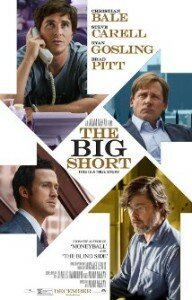Give me your jobless and homeless, disappointed and disenfranchised. The recent economic recession didn’t invent these conditions but were fuel to a fire in whose flames, perhaps, Trumpism was forged.
 To live through a crisis is the best way to understand it. But even those who lost jobs, homes and pensions can only look back and wonder WTF happened.
To live through a crisis is the best way to understand it. But even those who lost jobs, homes and pensions can only look back and wonder WTF happened.
If you don’t know more about it after seeing “The Big Short” – opening Wednesday – it’s not for lack of trying by director Adam McKay.
This comically muscular film about the economic meltdown, adapted from the book by “Moneyball” author Michael Lewis, pokes its finger in the eyes of banks responsible and the government agencies that were their slipshod overseers.
It deems their behavior negligent and criminal while humanizing a handful of investors who saw the collapse coming and bet in burn-the-village-to-save-the-village fashion that the too-big-to-fail housing industry would do just that.
Politicians, Wall Street and banks are broad side of the barn sized targets reduced by McKay to their venal essence. But the story is told through the eccentric caricatures of independent investors – played by Steve Carrell, Christian Bale, Ryan Gosling and Brad Pitt – who are anti-heroes at best.
In rooting for them to beat banks who rigged the game at the expense of the rest of us we are essentially rooting for “the end of capitalism” and global economic collapse. To their credit the main investors are themselves chagrined at the prospect at profiting from our loss but never imagined the scope of the disaster when they placed their bets.
Carrell’s character, an angry trader still mourning the death of his brother, in particular is anguished. But as the slick narrator and investor played by Gosling might say that’s getting ahead of the story.
It begins with a socially inept math savant, played by Bale, whose study of housing loan statistics revealed a black hole in the data. When Gosling heard that Bale made massive bets that the mortgage loan market would collapse he convinced dubious investor Carrell’s firm to take a similar position.
What happened next is obvious in retrospect. Banks were lending money willy-nilly to anyone with a pulse and then bundling those bad loans into bigger packages for investors and bundling more loans on top of those.
The result gave an impression of growth but was really a house of cards about to collapse, illustrated here by a teetering Jenga-type structure. Such devices break through the fourth wall like pages in a pop up book – a dismissive Margot Robbie explaining subprime mortgages while drinking champagne in a bubble bath, Anthony Boudrain making bouillabaisse to illustrate collateralized debt obligations or Selena Gomez at the roulette table with economist Richard Thaler to explain the domino effect of bad bets.
McKay – director of broad comedies like “Anchorman” and “Step Brothers” – brings a Jabberwocky of music, voices and white noise and a kinetic visual style to suggest all the tumult and chaos money can buy.
***1/2 Three and one half stars
With Ryan Gosling, Steve Carrell, Christian Bale, Brad Pitt, Tracy Letts, Marissa Tomei, Adepero Oduye, Hamish Linklater, Jeremy Strong, Rafe Spall, Finn Witrock, John Magaro, Melissa Leo.
Produced by Brad Pitt, Dede Gardner, Arnon Milchan, Jeremy Kleiner.
Written by Adam McKay, Charles Randolph. Directed by Adam McKay.
Rated R: language, nudity. Approximate running time: 130 minutes.
Tags: Adam McKay, Brad Pitt, Steve Carrell, The Big Short Posted by